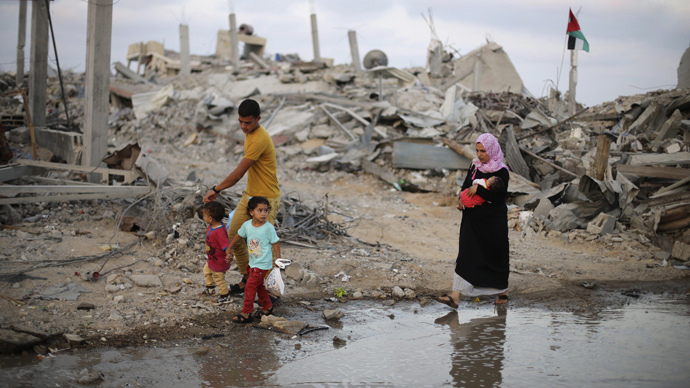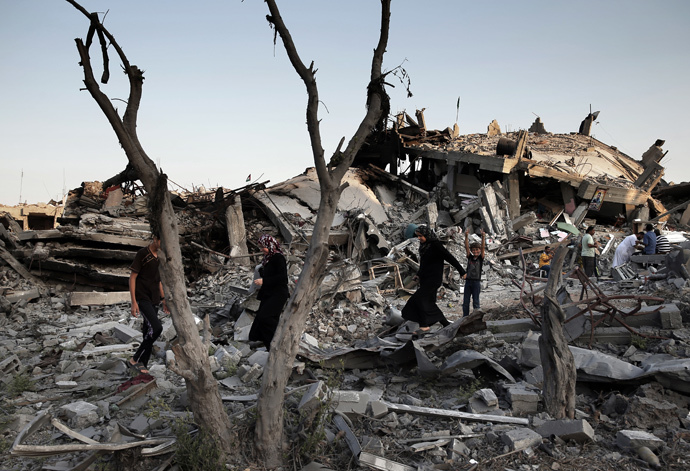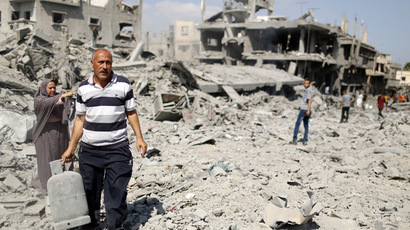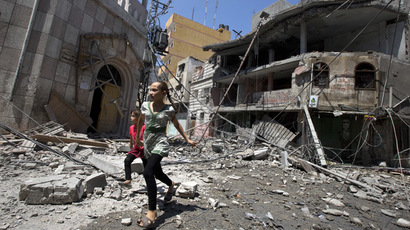Israel bars Amnesty & HRW from entering Gaza, hinders investigations – report

Israel has been preventing Amnesty International and Human Rights Watch workers from entering Gaza to investigate allegations of war crimes and human rights violations, claims a media report backed by group members’ statements.
Both human rights organizations have been unsuccessfully trying to get permission from the regional Civil Administration to enter Gaza since July 7, Israeli outlet Haaretz reports.
Israeli authorities cited two reasons for their refusal to grant appropriate permits: the closure of the Erez border crossing, located between Israel and the Gaza Strip, and that neither group is part of a list of aid groups approved by the Israeli Ministry of Social Affairs.
However, an Israeli newspaper pointed out that the Erez border crossing was in fact opened to “journalists, UN employees and Palestinians in need of medical care” during Operation Protective Edge, which began on July 8.
It also noted that, according to Israel’s COGAT (coordinator of government activity in the territories) guidelines, exceptions can be made for organizations that are not included on the list. The authority states that unrecognized groups “may submit an exceptional request that will be considered in light of the prevailing policy based on the political-security situation”.

HRW representatives have been barred from entering Gaza through the Erez crossing since 2006, while Amnesty’s representatives have been refused entry since June 2012. The two were able to use Egypt’s Rafah border crossing to enter Gaza until Mohamed Morsi’s government was brought down by the country’s armed forces in 2013. Since then, Egypt has not issued a clear response as to why it has closed its own border, though its military has been active in the Sinai.
Amnesty not considered an aid organization
While both HRW and Amnesty International have been actively trying to obtain permission from Israel to enter the Gaza Strip, their requests have been turned down on seemingly bureaucratic grounds.
Amnesty was told that it could not be registered with the Israeli Foreign Ministry, and the Social Affairs Ministry stated that the group does not qualify under the aid or humanitarian organizations category, according to Amnesty International’s Executive Director in Israel Yonatan Gher.
Reportedly, only UN agencies are included in the list, which is approved by Israeli authorities.

Both groups have criticized Israel, arguing that the ban has been hindering investigations into the human rights violations and war crimes on behalf of Israel’s military and Hamas.
“We’re doing everything we can, both Human Rights Watch and us, to do all the documentation we can, both on the ground in Gaza and remotely. But not being able to have researchers there does create difficulties,” Amnesty worker Deborah Hyams told Reuters, adding that the group had only one local worker on the ground.
At the same time, HRW Middle East researcher Bill Van Esveld stated his group had two representatives in Gaza.
“They’re overwhelmed. There’s so much to look into ... and physical evidence about the events there is disappearing as time goes by,” he said.
In response, Foreign Ministry spokesman Yigal Palmor told Haaretz he was not aware of complaints by HRW, but noted that Amnesty’s representatives could not enter Gaza because the organization is not registered with the Social Affairs Ministry.
“Entrance to the Gaza Strip through the Erez crossing is permitted primarily to humanitarian and aid organizations, journalists, diplomats, and international political officials. This is government policy and the criteria that the government set. I am not aware of any effort to withhold entry permits or registration from Amnesty for any political reason. As noted, the organization, by its own admission, does not meet the criterion set [humanitarian aid],” the spokesman said.
The entry bans come amid international criticism against Israel for allegedly violating war and humanitarian laws.
Last month, UN High Commissioner for Human Rights said Israel may be committing war crimes in Gaza. Speaking in Geneva, Navi Pillay said house demolitions and the killing of children raise the “strong possibility” that Israel is violating international law.
READ MORE: Israel may be guilty of war crimes – UN Human Rights Chief

This was followed by the UN’s decision to investigate possible war crimes committed by both Israelis and Palestinians during the two-month conflict in the Gaza Strip.
The team will look at “all violations of international humanitarian law and international human rights law … in the context of the military operations conducted since 13 June 2014,” and present a report in March 2015, according to a statement by the UN.
READ MORE: UN names Gaza war-crimes panel
Meanwhile, Egypt has officially announced a 24-hour extension in talks between Israel and Hamas on permanent Gaza truce.
“Palestinians and Israelis agreed on extending the cease-fire by 24 hours to continue current negotiations,” the Egyptian government said in a statement.
According to a Palestinian delegation source quoted by AP, the sides had exchanged draft proposals for a long-term truce that were to be addressed during the 24-hour extension in talks. The agreement came minutes before the five-day ceasefire was due to expire at midnight on Monday.
Six weeks of fighting in the Gaza Strip has killed over 2,000 Palestinians, most of them civilians, as well as 64 Israeli soldiers and three civilians.














